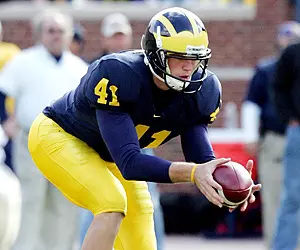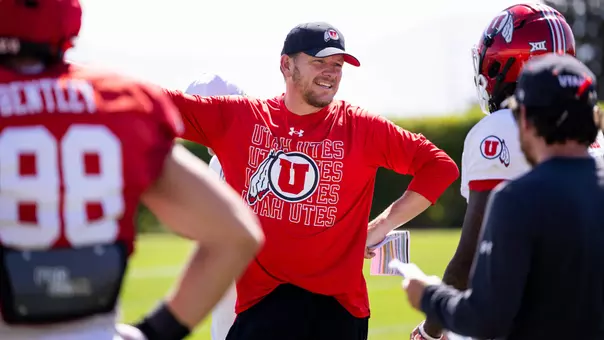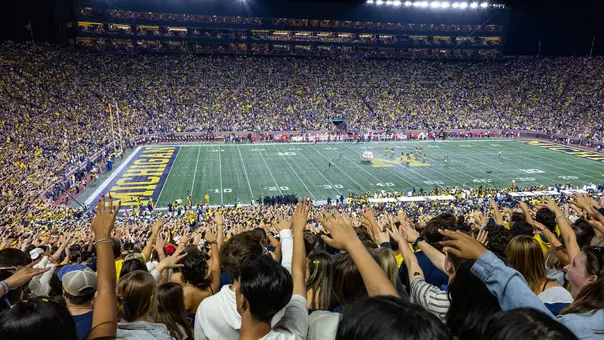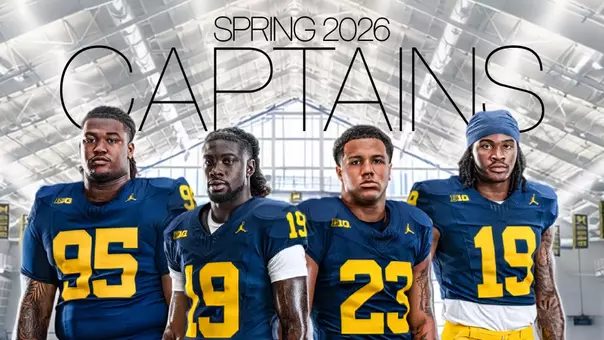
Mesko Prevails from Romania into the Maize and Blue
9/17/2008 12:00:00 AM | Football
On Christmas Day of 1989, three months before Zoltan Mesko's fourth birthday and 300 miles from his family's apartment building, Romanian president Nicolae Ceausescu and his wife were executed at the climax of the Romanian Revolution. The violent uprising that lasted less than two weeks and cost over 1,000 lives loosened the country from the grip of communism and changed the fates of the Meskos forever.
The Romanian Revolution began in Zoltan's hometown of Timisoara, a historic city of over 300,000 located on the Western edge of Romanian near Serbia and Hungary. On December 16, protests and riots broke out in the streets leading to martial law, armed violence and revolt in the capital city of Bucharest, just 300 miles away. Gunshots and rioting could be heard in Zoltan's apartment as he and his parents, Michael and Elisabeth, huddled for safety. On Christmas Day, the shooting stopped and the clashes ceased as the warring factions agreed on a ceasefire. Zoltan's grandparents walked five miles through the snowy streets of Timisoara to deliver presents and the family enjoyed a tense Christmas Day. That night, they watched television together and witnessed the end of Romanian communism. Nicolae Ceausescu had been tried and executed and the aftermath was broadcast across the country.
"I remember them showing the bodies of Ceausescu and his wife on television," said Zoltan. "They showed a lot on TV in Romania, not like here."
After Ceausescu's death, the fighting ceased, Romania returned to peace and everything changed.
During communism, rationing was standard with families given a strict allotment of staples like sugar, milk, bread and gasoline.
"Lines would stretch around the corner at many shops," said Zoltan. "There was even a waiting list for cars. We didn't get our first one until I was five."
A government that had once limited public gatherings and even prohibited Christmas trees was now open to the world.
"There were things you could pick up on the black market, but generally you saved your money because there was nothing to buy," said Zoltan.
Once communism ended, imported goods flooded the market, inflation set in, prices skyrocketed and the value of the Romanian dollar bottomed out. Once an upper-middle class family of engineers, Zoltan's parents were now living paycheck to paycheck.
"My father was in charge of a number of farm combines and my mother worked as an engineer at a power plant," Zoltan said. "Even though they had good jobs, we still struggled with the new economy. My mother would go overseas and buy clothing and other things to bring back to Romania. My dad would go to the market on Saturday to sell the goods so we would have more money. Even things like digital clocks, which were pretty rare, were very expensive at that time."
Romania was a difficult country to live in during the early 1990s and Zoltan's family began looking elsewhere for a better life. Denied entry into Germany, his father entered the family's name in the United States of American's green card lottery. With 19 million names submitted for 50,000 green cards, the Meskos beat long odds and were chosen for entry into the United States.
" I remember I was playing video games when my dad ran into the room with a big envelope," said Zoltan. "My mother thought he was bragging about killing another cockroach, because there was always something crawling around the apartment, but it was the paperwork for our green cards."
After a lengthy application process and medical tests, the Meskos were issued green cards and granted all the rights every U.S. citizen enjoys. The family moved to Queens, N.Y., in 1992 where friends of the family had arranged a job for Zoltan's father.
"The only impression I had of America was from subtitled movies we would watch in Romania," said Zoltan." "It looked amazing and I was so excited to get there, but when we got to Queens, it wasn't the America I had seen in the movies."
The transition to America was difficult for the whole family. Zoltan's father went to work in a factory assembling locks for doors, while his mother cleaned houses.
"We left our home, our furniture and our friends and it was difficult for my family to start over," said Zoltan. "My father had an office and was in charge of all the street cleaning in Timisoara when we left, so to have to work in a factory assembling locks was a big step down."
Luckily, a family who had won the green card lottery the year before had connections in Cleveland and the Meskos moved after just six months in Queens. Zoltan's father took a job as a quality control expert in a factory that manufactured black boxes while his mother worked for a company that did soil testing for groups like NASA and Cleveland Browns Stadium.
Zoltan's acclimation was assisted by athletics. Always a good soccer player, Zoltan joined a travel soccer team where he gained valuable language skills, socialized and learned that he had a particularly strong leg.
"We played soccer in Romania," said Zoltan, "but it was mostly in the streets between cars. Near my apartment building in Timisoara was a stadium owned by Ceausescu where the junior national team would play. We would climb a 12-foot fence and play on that field until the watchman came and his dogs chased us off."
Growing up in Ohio, football was ever-present but did not play a big role in Zoltan's life until his freshman year of high school. During a game of kickball in gym class, Zoltan smashed an overhead light high above the gymnasium with a big boot. The kick caught the eye of his gym teacher, also the middle school football coach, who mentioned that the varsity football team's kicker was graduating and that Zoltan should try out for the team.
"I saw all the people going to watch football games and the thought of kicking in front of 5,000 people was very appealing," said Zoltan.
In the fall, Zoltan found himself in an unfamiliar uniform playing an unfamiliar sport.
"In Romania, they would show the Super Bowl every year but because of the time difference I never saw it," said Zoltan. "Occasionally, I would catch the highlights of people smashing heads, but I didn't know that kicking was part of the game. The first time I put on the equipment I thought it was pretty sweet. I felt protected. But I wasn't used to the weight of the helmet and one time I pulled a muscle in my neck so badly that I couldn't look to my left for a week."
Zoltan adapted to his new sport quickly, choosing to kick field goals and punt on the advice of his special teams coach, Tom Dreiling, who kicked and punted at Ohio Northern University from 1994-97. At the start of his freshman season, Zoltan was all skin and bones standing 6-2 and weighing 155 pounds. By the end of the season, Zoltan had proven himself a capable football player and learned that scholarships were available for athletes who excelled at the sport. With a family that was still finding its financial footing in a new country, the prospect of an education partly or even fully funded motivated Zoltan in the off-season. He hit the weights like never before, working out all spring and summer to return to the football field a new man.
"Maybe it was my Eastern European genes, but I packed on almost 50 pounds that offseason," said Zoltan.
He returned stronger than ever at 6-3, 205 pounds. Zoltan earned all-conference honors as a sophomore and wound up an All-American by his senior year, standing 6-5 and weighing 242 pounds. Despite a brief experiment at tight end and on defense, Zoltan focused on punting, which he excelled at most, as a way to earn an athletic scholarship.
High school teammate Mike Smith, who earned a scholarship to Miami (Ohio), showed Zoltan the extent of his possibilities when Mesko attended Michigan's season-opening game in 2004.
"We got tickets to the game and I got to watch Mike catch a touchdown pass in Michigan Stadium," said Zoltan. "It was so cool to see a teammate make it where I wanted to be."
Zoltan's sights were set on Division III schools like Carnegie Mellon in Pittsburgh and Washington University in St. Louis -- schools with good academics that would give him a chance to play football. Zoltan never gave up on his dream to play at a Division I school and continued to attend football camps across the country to improve his skills. At a football camp at Indiana University, then-head coach Gerry Dinardo offered Zoltan a scholarship, fulfilling Mesko's dreams.
"When I told my parents they both cried," said Zoltan. "To this day when I see Coach Dinardo I thank him for the opportunity he gave me and the doors he opened for me. It was a chain reaction after that."
Zoltan's mother, always a big proponent of education over athletics, mentioned a football camp at the University of Michigan. Zoltan had never considered the Maize and Blue but he decided to go to Ann Arbor and show his stuff.
"There was no pressure because I already knew I was playing Big Ten football," said Zoltan. "I had nothing to lose. I had a great camp and the next day Coach Carr called me and offered me a scholarship. I accepted right away."
Zoltan arrived in Ann Arbor and had no trouble acclimating himself academically. In high school, he earned the team's academic award all four years and won the Cleveland Touchdown Club award, which is given to the conference's top scholar athlete. On the field, Zoltan redshirted the 2005 season and prepared for his debut in 2006. Platooning with then-senior punter Ross Ryan, Zoltan knew he would get a chance to punt in the opening game against Vanderbilt. He assumed, since Ryan had taken all of the reps with the first team, that he would take the second punt of the game. But with Michigan ahead 7-0 and the second offensive drive of the season stalled in Michigan territory, Mesko's name was called.
"I wasn't nervous until I got on the field, and then I thought, 'Oh my God'," said Zoltan. He shook off the nerves and booted a gorgeous punt 45 yards downfield, beginning his collegiate career.
After a successful redshirt freshman splitting time with Ryan, Zoltan took full control of the punting duties in 2007, finishing fifth in the Big Ten in punting average as a Ray Guy Award candidate. He already ranks among the top 10 Wolverines all-time in punt yardage and has the third-best punt yardage average in the history of the program.
With less than two years remaining in his collegiate career, Zoltan remains very focused on the present.
"It would be nice to play professionally, but I'm not thinking about that right now," said Zoltan. "I want to be one of those players who comes back after achieving great things after football. I can't be president like Gerald Ford, but I want to be of that caliber."
The finance and marketing major has aspirations of a career in business, hoping to one day run his own company.
"During camp, we had David Brandon, the CEO of Dominos Pizza, come in and speak with us," said Zoltan. "I would love to come back in that fashion and give a pep talk to the team."
Zoltan has been back to Romania twice since leaving in 1992, once at the end of sixth grade and once at the end of his freshman year of high school. His grandparents made the trip to Ann Arbor this year and saw their grandson play football for the first time against Utah.
"They were mesmerized by the crowd and the experience," said Zoltan.
Football has taken root in Romania since Zoltan left with a number of teams cropping up in a number of cities. You can cheer for the Bucharest Warriors, the Constanta Sharks, the Vaslui Wolves and the Oradea Stars. Zoltan is often inundated with questions from various chat boards and blogs, which he tries to answer as best he can.
"Sometimes there are 50 or 60 questions a day," said Zoltan, "but I'm glad they are starting to play American football there."
There are few things that Zoltan has not accomplished in his young life, but recording a collegiate tackle is one of them. He came close in the game against Notre Dame in 2007, but luckily fate intervened.
"Tom Zbikowski, their returner, got free on a punt return that was later called back on a Notre Dame penalty," said Zoltan. "He was heading right at me and I thought, 'I'm about to try and tackle a Golden Gloves boxer.' I went for him but I missed and spun out of bounds, tackling Charlie Weiss. I still remember him looking over me as he fell."
Zoltan pauses for a second to relive the moment.
"I never did tackle Zbikowski."











